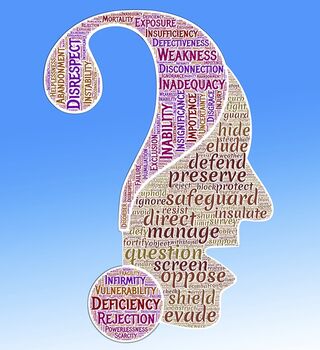
You're worried. What word do you want to use to convey it? Perhaps one of these more nuanced variants of "worry" in my Psychology Today article today will accurately express it.
Fresh ideas about career, education, the life well-led, and improving the world.



You're worried. What word do you want to use to convey it? Perhaps one of these more nuanced variants of "worry" in my Psychology Today article today will accurately express it.

Many people's bucket lists are conventional: perhaps going on safari
and eating at a Michelin-starred restaurant. Especially if you're
psychologically attuned, you might prefer one or more of those I offer in my Psychology Today article today.

We're more likely to be understood when we use nuance in our language. Previous installments in this series offered nuanced words for “love” and “anger.” My Psychology Today article today offers some for "happy" and "sad."

If you’re going to express anger, it should reflect the nuance of your feeling. Sometimes, “angry” doesn’t quite do it.
My Psychology Today article today offers 11 more nuanced words for “angry.” See if one or more belongs in your verbal or written toolkit.
Today, when you ask someone, “How are you?” you may hear a perfunctory "fine." But you may well hear: "Hangin' in." "Tired." “Slammed.” "Overwhelmed." Indeed, like many of my clients and friends, I find our modern times challenging.
In the supermarket, I saw a can of Simpler Times beer and thought, “Hmm, that's appealing.” My Psychology Today article today offers some thoughts on how to create a simpler time for ourselves in today’s far-from simple world.
The partnership highway is littered with roadkill, not just romantic partners and business partners, but virtually any sort of partnership. After all, at the beginning, it’s easy to see the synergies, but individuals’ differences soon emerge, often causing conflict.
How can you boost the chances of your synergies outweighing the conflicts? My Psychology Today article today offers some advice.

As we enter tax season, we may avoid hairy but necessary activities. Of course, that’s not limited to taxes. It's anything you'd find unpleasant, or the technical term, yucky.
Whatever you’re tempted to procrastinate about, one of more of the eight tools I offer in my Psychology Today article today should help.
Even if you're young, drafting your legacy can help you live the life you aspire to. My Psychology Today article today makes the case and lists 14 possible legacy aspirations.

Much self-help advice assumes that homo sapiens is a social animal. Under-considered are people who prefer to go largely solo. My Psychology Today article today attempts a bit of remedy.

Certitude is comforting but elusive, and doubt can provoke anxiety. Consider this composite based on my clients, friends, and me.
I worry…about almost everything. Did I buy the right thing? Was I too tough or too nice? How hard should I work? How hard should I play? How much should I trust that person, even my wife?! Help!

I was interviewed last week and, off the air, the host asked, "How the hell are you so productive?" My Psychology Today article today paraphrases my answer.

Yesterday, my post was How to Become More Productive. As a counterpoint, my Psychology Today article today makes the case for laziness, although I do ask a few doubting-Thomas questions.

The life well-led may reduce to balancing gratitude, acceptance, and striving.
Gratitude is important because there’s much to be grateful for that's easily forgotten. Acceptance is important because much is resistant to change. Striving is important because we should be growing and achieving.
To encourage your balancing that triad, list things that you should feel grateful for, are wise to accept, and should strive for.
To prompt your thinking, My Psychology Today article today offers some examples. They're derived from my clients, friends, and me.

Especially if you’re down in the dumps, you’d probably welcome something to pull you up. One thing that my clients have found helpful is rather simple: Just think of something you're looking forward to. Or if you can't think of anything, think of something you could do that you'd look forward to.
To illustrate and to trigger your thinking, my Psychology Today article today offers 29 possibilities.
Quotes are a fast way to acquire life lessons and to deepen your understanding of how the world really works. But reading lists of quotes an be boring.
So, in my new slim book Dialogues to Grow From, I stitch together quotes from 21 pairs e.g., Bill & Hillary, Victor Davis Hanson & St. Matthew. even Woody Allen, Wanda Sykes, and Joan Rivers.
Until Thurs, the Kindle/e-book is free: https://amzn.to/3gFgprz Of course, it's not required but I'd welcome an honest review of it on Amazon.com

My Psychology Today article today offers "why" questions that can help you understand yourself better and, if you're trying to understand another person, give wordings that reduce the chances that you'll be perceived as invasive.
After each question, I offer a few possible answers that are drawn from my clients, friends, and me. Those answers demonstrate how helpful such questions can be.
A case can be made for being more competitive and less so. My Psychology Today article today asks questions to help you decide what's right for you.

Whether it's in your Valentine’s Day card or otherwise, you of course want to express your love as you mean to. My Psychology Today article today may help.

It seems that more of my clients are choosing to shrink their world. My Psychology Today article today offers a case study. It then asks questions to help you decide if you want to keep your world small, and offers suggestions in case you want to take baby steps to interacting more.

We all look in the mirror: Good hair day? Another wrinkle? To give yourself a pep talk?
But there’s more to be seen in the mirror, and that can be enlightening and/or scary.
Dare to take a look, a good long look? My Psychology Today article today suggests things to look for, not just in appearance but as a window into who you are, and some ideas if you'd like to change

Most people claim to be open-minded or at least aspire to be, but it’s not so easy. How open are we really to core views other than our own? A few examples: liberal vs conservative, religious vs atheist, or if you’re in psychology, psychodynamic versus cognitive-behavioral therapy.
And some people don’t want to be more open-minded, perhaps because they enjoy the certitude of their "rectitude," or because they feel they've sufficiently considered an issue and don’t want to spend more time on it.
But if you might want to become more open-minded, My Psychology Today article today may help.
Work is almost the best way to pull oneself out of the depths— Eleanor Roosevelt

In this installment of The Quests series, my Psychology Today article today begins with a first-person report from "Jeremy," a composite of my clients' experiences. It embeds four important practices, and after "Jeremy's" report, I call them out.

We think of rehearsing for a performance, job interview, or wedding toast, but it can be helpful in other situations. I discuss in my Psychology Today article today.

Taking an extra moment—so easy, so transient. How much difference could it make?
Well, taking just an extra second can often make quite a difference in many situations, from conversation to negotiation, eating to flirting.

The previous installments in The Quests series are “Finding a Good Job,” “Finding and Deepening a Relationship,” and “Finding a Good Place to Live.”
My Psychology Today article today turns to finding and keeping diet discipline: consistently not consuming more calories than we think wise.
The previous installments in this The Quests series are on finding a good job, relationship, peace of mind, place to live, and diet discipline.
In my Psychology Today article today, we turn to money: how to get it, how to grow it.

This is the fourth installment in The Quests series. The previous ones are Landing a Good Job, Finding and Deepening a Relationship, and Finding Peace of Mind.
In my Psychology Today article today, we turn to finding a good place to live. As the previous installments did, this one begins with a composite first-person report from “Jeremy” based on my clients’ and friends’ experiences. Then, I call out the embedded principles and practices.